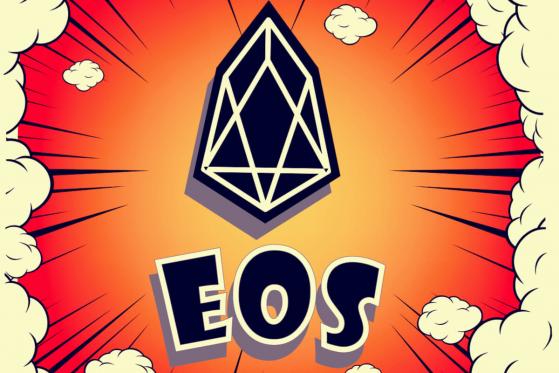EOS has been fuelled by the hype built up over its year-long ICO. Expectations are high but will it rise to meet them? Questions have been raised over its mainnet launch struggles and subsequent hesitations. In this article, we’ll look at whether or not it will meet its potential and how it stands as a viable competitor to Ethereum.
What’s the deal with EOS?
EOS promises to be a next-gen cryptocurrency offering sub-second latency, meaning it can match and beat the transaction capacity of networks like Visa. By offering block times of 500ms, transactions are made at outstanding speeds comparable with high-speed cryptocurrencies such as NANO (NANO) and Ripple (XRP).
This means that it can support decentralized applications (Dapps) including games, which require fast speeds. EOS recently revealed an upgrade to their space invaders game which can now be played live on the network. In a nod to the origins of gaming on the internet, it looks forward to the time when much larger games will be either played on the blockchain or will integrate cryptocurrencies as in-game payments.
How does Ethereum size up?
In contrast, Ethereum currently has a block time of 10-20 seconds. This is thirty times slower than EOS. It also manages 15 transactions per second (TPS), nowhere near enough to be used by gaming platforms. The popular Ethereum Dapp Cryptokitties caused the network to struggle when it was launched as the network could not handle the load.
Ethereum does have plans to upgrade the network, however. They are working on Casper, which will utilize new methods, such as sharding, to achieve a much higher TPS. Sharding is a proven concept advocated by Zilliqa who have based their high TPS cryptocurrency ZIL on it. They are also moving slowly towards a Proof-of-Stake (PoS) consensus mechanism which will allow for faster transactions.
Ethereum is also a secure network. It has a very good track record except for the controversy of the DAO hack. This was set up as a project crowdfunding platform using smart contracts by Slock.it but was compromised in its code. This led to the hard fork from the Ethereum Classic blockchain to the Ethereum blockchain – where the stolen coins were returned to users through a 51% ‘friendly’ attack on the network. For this, the majority of the network ‘re-wrote’ the blockchain and it was accepted because it became the longest chain.
Issues surrounding EOS
EOS has been plagued by difficulties since a few days before it was set to launch. Chinese security company Qihoo 360 asserted that there was an ‘epic vulnerability’ present in the system. This was quickly fixed but it led to fears over other issues. A bounty program was set up which offered up to $10,000 for identifying bugs. A lot of bugs were found, which is both reassuring and worrying.
Once they got a consensus to launch the mainnet, it went live in a few days with 15% of the network voting on the block producers. Yet it has not been clear sailing since then. Some users were conned into handing over their private keys. Why did they do this? Because the network requires users to enter the private keys but they have to make sure it’s to the right party. Following malicious actors attempting to use the private keys to steal funds, the EOS block producers froze seven accounts. This has led to worries over how much control they have.
The EOS design has also been criticized for moving towards a more centralized consensus model anyway. Bitcoin blocks can be mined by anyone who can create the right type of hash number. In theory, this allows anyone to mine blocks but has resulted in some fears over mining pools controlling too much power. In contrast, EOS owners vote on the honesty of the nodes and the top 21 honest nodes become the block producers and get transaction fees and mining rewards. This means only 21 actors are responsible for the whole network at any one time.
EOS or Ethereum?
EOS has certainly had teething problems and the questions being raised over centralization need to be answered. However, the project has bags of potential for providing a successful Dapp ecosystem. Ethereum is the main player in the market at the moment but if the EOS network achieves stability and doubts start to fade, then it is likely that developers will move over to its network. Ethereum CEO Vitalik Buterin needs to bring in Casper, and needs to do it fast.
This article appeared first on Cryptovest
